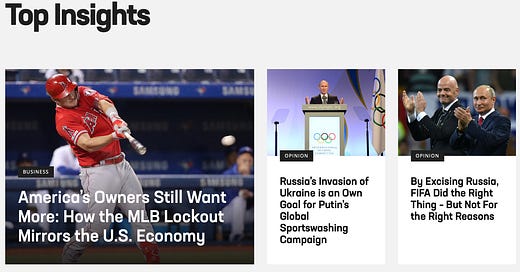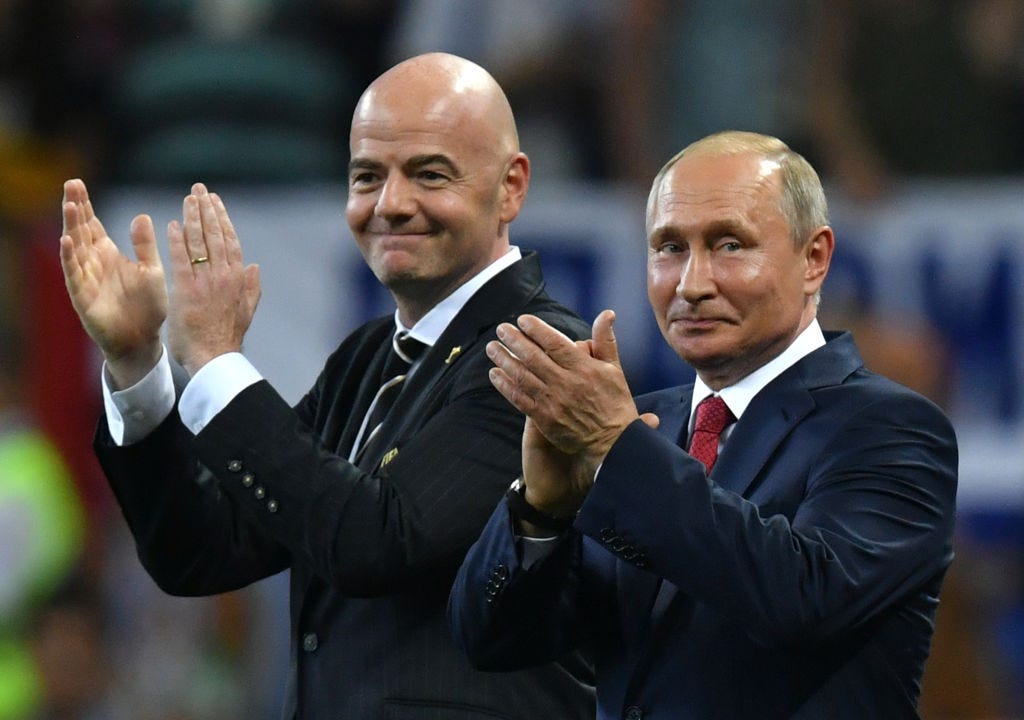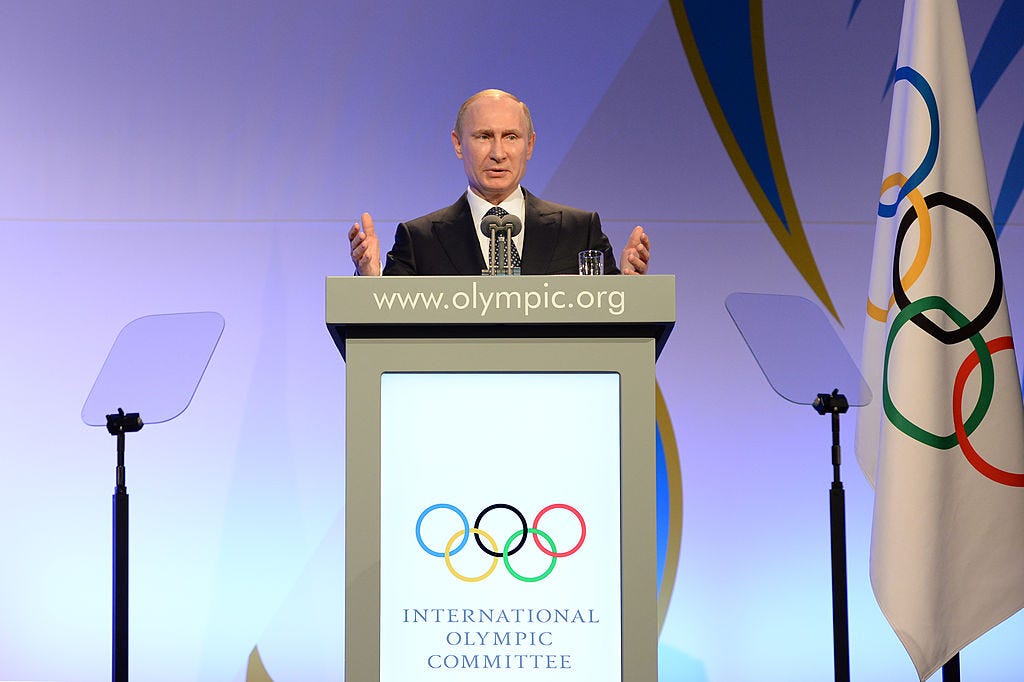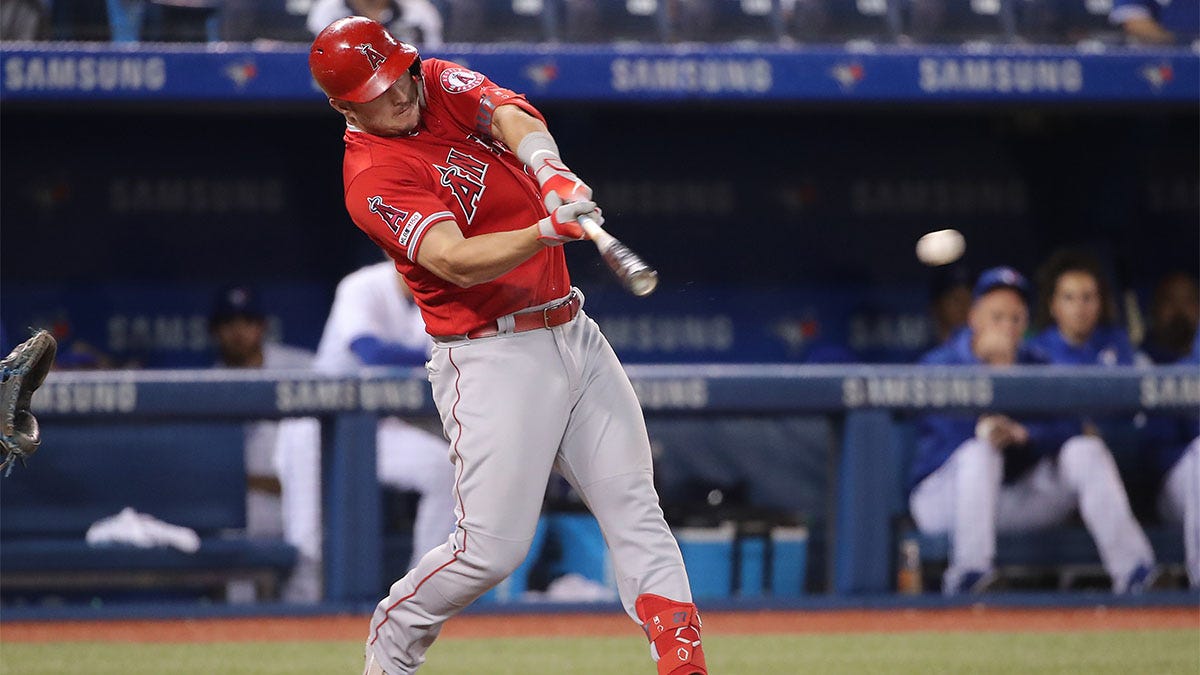FIFA’s Ersatz Courage, Putin’s Sportswashing Debacle, and How the MLB Lockout Explains America’s Economy
At Global Sport Matters, we have takes!
Welcome to Hreal Sports, a newsletter written by Patrick Hruby about sports things that don’t stick to sports. Sign up and tell your friends!
Over at Global Sport Matters, we’re working on our take game. Not hot takes. Nothing too shouty. That wouldn’t fit our mission. Instead, we’re tying to develop our capacity to provide informed and insightful commentary on current events—stuff that hopefully will make you a little smarter, and help you understand the broader context of the whatever’s in the news that is making people heated and loud.
For a pretty significant portion of my career, I’ve reported and written those kinds of takes myself. I enjoy it! And it’s something that I’ll surely come back to. For now, however, I’m taking everything I’ve learned about editing over the last half-decade and applying it to other people’s thoughts and voices—helping them shine and be the best versions of themselves. Turns out that’s both fun and rewarding, in part because it feels good to support writers who have interesting and important things to say, and in part because I get to have an active hand in creating more of the sort of sports commentary that I want to see and read.
Anyway, that’s the broad background for the articles I’m sharing below. The first two offer insight into the sports-related aspects of Russia’s invasion of Ukraine and the world’s response, while the third covers how the economic fight at the heart of the Major League Baseball lockout reflects a similar—and highly relevant!—fight at the heart of the modern American economy.
I hope you’ll take the time to click through and read these. Later this week, I’ll have story links and summaries for our brand new issue of Global Sport Matters—which covers how to reform and improve college sports—and well as a new piece from yours truly.
“By Excising Russia, FIFA Did the Right Thing – But Not For the Right Reasons,” by Leander Schaerlaeckens.
The good news? FIFA—an organization that historically has had zero qualms about partnering with various unsavory regimes and world leaders, especially if there’s a buck to be made—responded to Russia’s aggression against Ukraine by effectively exiling the former country from the upcoming World Cup.
The bad news? As Leander Schaerlaeckens explains, international soccer’s governing organization hasn’t exactly become Amnesty International.
Did FIFA do the right thing? Yes. Did it do the right thing for the right reasons, showing that it can be counted on to do the right things in the future? Absolutely not. Soccer’s global governing body hasn’t suddenly grown a conscience, let alone a moral backbone. By taking action against Russia, it simply did what it had to do – all while hoping that the world would forget all about Infantino’s many previous proclamations hailing Putin, which have aged as disastrously as a Halloween pumpkin left on the porch for an entire winter.
At the 2018 World Cup in Russia, Infantino declared that “this is a new image of Russia that we now have.” He called himself and Putin “a team.” He subsequently praised Putin with “a big well done” after Russia hosted the Beach Soccer World Cup in 2021, never mind that the World Anti-Doping Agency had urged governing bodies not to stage major sporting events in Russia in the wake of its state-sponsored doping scandals.
Right now on FIFA’s website, there is a story about Infantino receiving Russia’s Medal of Friendship in 2019, illustrated with a picture of the beaming Swiss sportocrat shaking hands with a smirking Putin.
“Russia’s Invasion of Ukraine is an Own Goal for Putin’s Global Sportswashing Campaign,” by Andrés Martinez.
From the Sochi Games to the World Cup to oligarch ownership of Chelsea, Vladimir Putin has deliberately used sports to burnish Russia’s image at home and abroad. That’s in the trash can, now—and as Andres Martinez explains, the world’s sudden rejection of Putin’s “sportswashing” could impact ongoing and future efforts by other regimes and leaders to do the same.
In another self-inflicted wound for Putin, the United States will now have a stronger hand in the ongoing geopolitical contest to control the fate of the one form of shared public culture and live media that most passionately connects the largest number of people around the world: sport. Recent years have seen the rise of two competing visions of global sport governance: the “sportswashing” practiced by some Persian Gulf states and regimes like Putin’s and Xi Jinping’s, and the commercially-driven expansion of private American sporting interests.
“America’s Owners Still Want More: How the MLB Lockout Mirrors the U.S. Economy,” by Hal Singer and Ted Tatos.
Productivity and profits keep rising. The slice of that pie that goes to labor keeps shrinking. That’s the story of the American economy over the last couple of decades—and as it turns out, it’s also the story of Major League Baseball. As Hal Singer and Ted Tatos explain, the perpetual chiseling of workers largely can be explained by owners finding ways to not compete for their services. That’s true in MLB’s collective bargaining agreement, and also true in the economy at large.
Sports are a microcosm of the larger economy, and the financial motivations and machinations of sports owners reflect those of America’s corporate executives. In the economy writ large, workers have collected a shrinking percentage of their employers’ revenues: following a brief upturn in the late 1990s, the labor share of U.S. income has fallen from 63.3 percent in 2000 to 56.7 percent in 2016.
Is a lack of competition for labor to blame for this decline? For a long time, mainstream economists have operated under the assumption that labor markets are perfectly competitive—which means other factors must be responsible. For example, David Autor of the Massachusetts Institute of Technology and others have propagated a theory that declining labor share can be attributed to “superstar firms” that have overtaken industries and just happen to not use as much labor for production.
However, a new Treasury Department report released this week finds that the lack of competition in the job market costs workers, on average, 15 to 25 percent of what they might otherwise make. Listing all of the tactics used by employers to weaken labor competition and undermine pay — including non-competes with workers, no-poaches with rivals, acquisitions of rivals, and outsourcing of work to contractors — the report concludes that the labor share is falling due in part to the lack of competition employers face for labor. Upon the report’s release, Ben Harris, Assistant U.S. Treasury Secrgetary in the Office of Economic Policy, said that “there is a recognition that the idea of a competitive labor market is a fiction.”
This has been Hreal Sports, a newsletter written by Patrick Hruby about sports things that don’t stick to sports. If you have any questions or feedback, contact me at my website, www.patrickhruby.net. And if you enjoyed this, please sign up and share with your friends.







